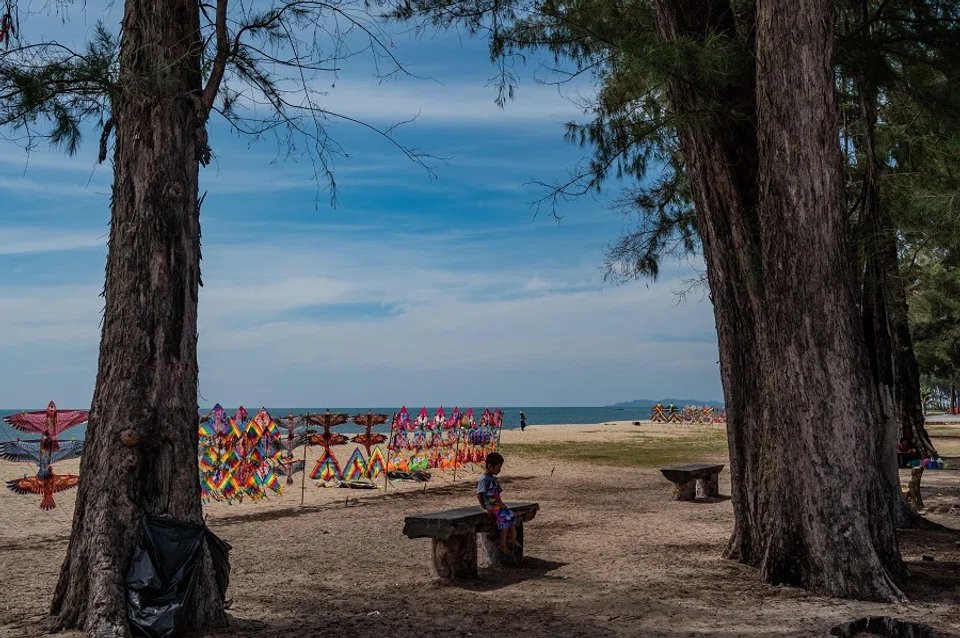[South China Sea] Is Malaysia adopting a more confrontational SCS policy?
In recent years, Malaysia seems to have moved away from its role as a "low-profile pragmatist" in the South China Sea dispute as it seeks to assert its rights over oil and gas exploration in the disputed waters, and as its threat perceptions of China increase. It looks set to continue butting heads with China amid the ongoing global pandemic and increasing US-China competition in the region.

The South China Sea (SCS) dispute, involving China and several Southeast Asia countries, remains unresolved. Watching developments unfold, many would have realised that compared with China's relations with the Philippines and with Vietnam, the situation between China and Malaysia is relatively peaceful. However, this state of affairs seems to be changing lately - China-Malaysia relations are becoming more sensitive on issues of the SCS.
In December 2019, Malaysia made a submission to the UN Commission on the Limits of the Continental Shelf "for the remaining portion of the continental shelf of Malaysia beyond 200 nautical miles in the northern part of the South China Sea". Since late 2019, the drillship West Capella contracted to Petronas (Malaysia's state-owned energy company) has been operating near the outer edge of Malaysia's 200-nautical-mile exclusive economic zone (EEZ). In April and May this year, America and Australia sent warships near a Chinese government survey ship and a coastguard vessel which were in the area to monitor the West Capella's operations. Before this incident, Chinese and Malaysia government vessels have had a series of tense standoffs in the Spratlys.
Malaysia does not view the SCS issue as an important topic of discussion and would rather advance practical cooperation between the two countries during China-Malaysia dialogues.
Relations between China and Malaysia vis-a-vis the SCS have gone from a state of relative peace to one fraught with sensitivity. Malaysia's change in SCS policy in recent years is the main cause, although the ongoing pandemic, intensifying China-US competition and power struggles in the SCS have played a part. Before the change in policy, Malaysia has traditionally adopted a safe and pragmatic stance. Chinese and external observers alike have long regarded Malaysia as a "low-profile pragmatist" when it comes to SCS issues because it has always kept a low profile and hoped to play safe.

As a low-profile pragmatist, Malaysia's SCS policy is based on the following: Firstly, Malaysia does not view the SCS issue as an important topic of discussion and would rather advance practical cooperation between the two countries during China-Malaysia dialogues. Secondly, its long-term focus lies on developing oil and gas resources, and such a goal firmly guides its low-profile SCS policy. Thirdly, the Malaysian government has never been fond of escalating the SCS disputes, and neither did large-scale demonstrations occur in Malaysia as a result of these disputes. Lastly, it has always adopted a more positive attitude in promoting exchanges and preventive diplomacy among all parties in the SCS, and has also played a relatively positive role during the discussions on the Declaration on the Conduct of Parties in the South China Sea (DOC) and Code of Conduct (COC).
As such, China and Malaysia were able to display a high degree of consensus in jointly accelerating practical cooperation between both countries and maintaining peace and stability in the SCS region. However, this also means that if Malaysia's SCS policy were to change, the peace and harmony that China and Malaysia previously enjoyed would be affected.
Malaysia no longer a "low-profile pragmatist"
Various facts show that Malaysia's SCS policy has indeed changed.
Malaysia has repeatedly made unilateral claims in international jurisprudence. In 2009, it made a solo submission and then a joint submission with Vietnam to the United Nations (UN) on the delimitation of its continental shelf. (NB: Under UNCLOS, coastal states are granted 200 nautical miles of EEZ. Beyond that, the outer limits of their continental shelf are determined after making a submission to the UN's Commission of the Limits of the Continental Shelf (CLCS).) And as mentioned earlier, ten years later in December 2019, Malaysia again submitted a proposal to the CLCS.
Malaysia is also becoming wary and uneasy over China's regular and systematic measures to safeguard its sovereignty over the SCS and maintain stability in the region.
Next, while Malaysia has always been focused on the exploration and development of oil and gas resources, its increasing activities in the areas disputed by China, Malaysia, and Vietnam is unprecedented.

Malaysia is also becoming wary and uneasy over China's regular and systematic measures to safeguard its sovereignty over the SCS and maintain stability in the region. The "confrontation" between both countries had also occurred as a result of this unease. As China-Malaysia relations have become more sensitive due to SCS issues, Malaysia has started to give weight to these issues and has established a bilateral consultation mechanism for maritime issues with China in September 2019.
Although the formalisation of a bilateral consultation mechanism conforms to the "dual-track approach" on matters of the SCS and is beneficial to both sides in jointly safeguarding the security and stability of the SCS to a large extent, this is also undoubtedly a change in Malaysia's SCS policy.
Thus, the exaggerated amount of attention that the China-Malaysia SCS dispute has received is related to other factors such as the global pandemic, and growing China-US competition in the SCS.
Malaysia's changed SCS policy is an important reason for the growing sensitivity in China-Malaysia relations on the SCS. However, it does not explain why the SCS dispute between China and Malaysia has come under the spotlight.
Changes in Malaysia's SCS policy do not imply that Malaysia is unaware of the complexities and sensitivities of the SCS issue. For example, Malaysian foreign minister Hishammuddin Hussein has recently emphasised the importance of "continuous communication with all relevant parties", as well as "work[ing] together to maintain peace, security and stability in the SCS". Thus, the exaggerated amount of attention that the China-Malaysia SCS dispute has received is related to other factors such as the global pandemic, and growing China-US competition in the SCS.

It is under such circumstances that the US and Australian navies have intentionally approached the site of China-Malaysia "confrontation" during their exercises. The United States Indo-Pacific Command has even admitted that the US supports the efforts of their allies and partners in safeguarding their economic interests. Moreover, US Secretary of State Mike Pompeo has also accused China of taking advantage of the pandemic to execute coercive strategies on its neighbours, and considers the measures that China has taken to safeguard its sovereignty over the SCS and maintain stability in the region as "bullying".
It can be surmised that the growing sensitivity between China and Malaysia over the SCS does not only affect the two countries alone. The China-Malaysia SCS dispute has also become the means through which the US seeks to sway public opinion over the SCS issue and form an offensive against China. Under such circumstances, all parties should remain cautious in behaviour and pragmatic in attitude.
Editor's note:
In recent weeks, the US and China have upped the ante in the SCS dispute. China conducted military drills in the waters near the Paracel islands (what it calls Xisha Islands) saying it was well within its rights to do so. A US Department of Defense statement said: "Conducting military exercises over disputed territory in the SCS is counterproductive to efforts at easing tensions and maintaining stability. The PRC's actions will further destabilise the situation in the SCS. Such exercises also violate PRC commitments under the 2002 Declaration on the Conduct of Parties in the SCS to avoid activities that would complicate or escalate disputes and affect peace and stability."
Vietnam, a claimant state in the SCS dispute, also reacted with consternation. Its Ministry of Foreign Affairs spokesperson Le Thi Thu Hang, said, "The drill carried out by China around the Paracel Islands violated Viet Nam's sovereignty over the Paracel Islands, contravenes the spirit of the Declaration of Conduct of the Parties in the South China Sea (DOC), complicates the situation and is not conducive to current negotiation between China and ASEAN on the Code of Conduct in the South China Sea (COC) as well as the maintenance of peace, stability and cooperation in the SCS."
Vietnam is also the current chair of ASEAN. In the recent ASEAN Summit Chairman's Statement on 26 June, the ASEAN states reaffirmed that "the 1982 UNCLOS is the basis for determining maritime entitlements, sovereign rights, jurisdiction and legitimate interests over maritime zones, and the 1982 UNCLOS sets out the legal framework within which all activities in the oceans and seas must be carried out".
In a video statement, Philippine Foreign Secretary Teodoro L. Locsin Jr. said: "These exercises are taking place in waters off Xisha Islands - the Paracels - over which Vietnam claims sovereignty. Should the exercises spill over to Philippine territory, then China is forewarned that it will be met with the severest response, diplomatic and whatever else is appropriate."

At around the same time, the US conducted a fresh round of Navy exercises on 4 July involving two aircraft carriers, the USS Nimitz and the USS Ronald Reagan. A statement from the US Navy said: "The Nimitz Carrier Strike Force celebrated Independence Day with unmatched sea power while deployed to the SCS conducting dual carrier operations and exercises in support of a free and open Indo-Pacific." Chinese foreign ministry spokesperson Zhao Lijian has deemed this a provocation, saying on 6 July that it is "completely out of ulterior motives" that the US "flexes its muscles by purposely sending powerful military force to the relevant waters". He went on to say that the US seeks to "drive a wedge between regional countries, promote militarisation of the SCS and undermine peace and stability in the region".
Military affairs academic Wang Yunfei said in an essay in Toutiao (《今日头条》) that the US carrier strike force came calling on its own, giving the Chinese forces just the target training practice they were looking for. In addition, in August, the Chinese Navy may embark on another exercise in the SCS.
Meanwhile, China has also announced in recent days that its reserve military forces will now be under the charge of the Communist Party of China (CPC) Central Committee and the Central Military Commission. It is believed that this move is to allow the PLA to be more agile in tackling potential large-scale conflicts that may arise in various hotspots.
Philippine Foreign Secretary Teodoro L. Locsin Jr. said in a statement on 12 July, the anniversary of the arbitral tribunal ruling released by the Permanent Court of Arbitration in The Hague in 2016 in the arbitration instituted by the Philippines against China: "The Tribunal ruled that certain actions within the Philippines' EEZ violated the Philippines' sovereign rights and were thus unlawful; that large-scale reclamation and construction of artificial islands caused severe environmental harm in violation of international conventions; that the large-scale harvesting of endangered marine species damaged the marine ecosystem; and that actions taken since the commencement of the arbitration had aggravated the disputes."
Related: Amid domestic political change, Malaysia sticks to trusted formula for South China Sea disputes | Indonesia crosses swords with China over South China Sea: 'Bombshell to stop China's expansionism'? | US aircraft carrier visit and Vietnam's delicate balancing act | Visiting Forces Agreement: Uncle Sam still welcome for another year in the Philippines | The Philippines' termination of the Visiting Forces Agreement: A win for China and Russia



![[Photos] Fact versus fiction: The portrayal of WWII anti-Japanese martyrs in Taiwan](https://cassette.sphdigital.com.sg/image/thinkchina/3494f8bd481870f7c65b881fd21a3fd733f573f23232376e39c532a2c7593cbc)

